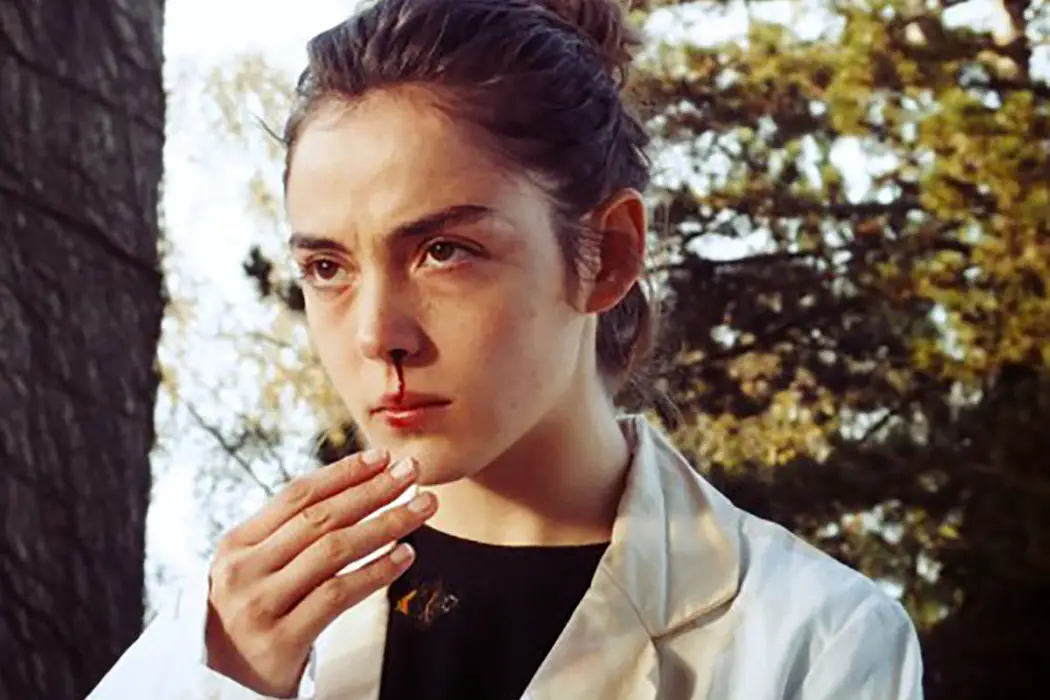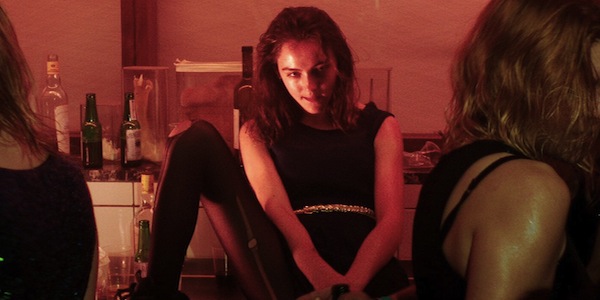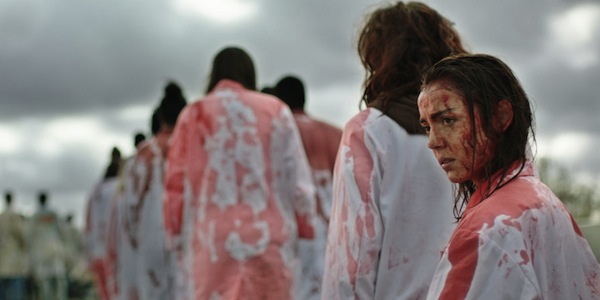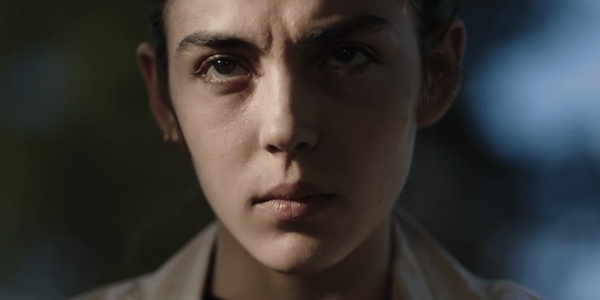RAW: Delicious To The Bone

Sophia Cowley is a young writer, yogi, feminist and film…
Just in time for Halloween, writer/director Julia Ducournau’s Raw hits Netflix streaming, somewhat comically placed under “Teen Screams.” The debut director’s film, which showed at Cannes, TIFF and the London Film Festival last year, among others, received high appraisal for its originality and hauntingly sinister visuals. Raw became known to audiences as the “French cannibalism” movie, but there is so much more to it than that.
As the story goes, a college freshman and life-long vegetarian named Justine takes part in a hazing ritual in which she eats raw meat, subsequently revealing an unfathomable need for meat in all its forms. Last April, Alex Lines talked about the film’s anti-shlock qualities, and how it was wrongly labeled “barf bag cinema” upon the film’s release. Alex compared the film to Yorgos Lanthimos’ The Lobster, a similar genre film that played on black comedy and goreish elements. I would like to offer a few new comparisons, and bring to light themes of female sexuality, BDSM, and biblical references.
Presence of Pain
In one key scene, Alexia, Justine’s sister, attempts to give her a Brazilian. The pain is unbearable for Justine. Later, Justine’s tolerance for pain increases exponentially; actually, she welcomes it, biting herself on several occasions. The violence she witnesses while at school transgresses into her sexual desires. As a result, Justine quickly trades in the good-girl scholar for the twisted dominatrix. (And thank god, because a blood-thirsty vixen is far more enthralling, in my opinion.)

Justine’s sexual preferences appear to be explicitly linked to her need to both inflict and withstand pain. As her cannibalistic hunger intensifies, so too does her libido, which comes with a healthy dose of BDSM. While I don’t think Ducournau set out to make a film about sex, it does become an important plot point as Justine develops a taste for flesh in more ways than one.
The Virgin
I don’t believe it is a coincidence that Justine is a virgin upon entering college. As previously mentioned, one could draw parallels between her hunger for flesh and her unfolding sexual drive. A Freudian analysis might point to her need for meat as a distinct placeholder for sex, an unconscious desire that ultimately rises to the surface.
When Justine walks in on her roommate with another man, she lingers by the door, captivated by what she cannot have. As Justine grows increasingly infatuated with Adrien (the roommate) she also takes part in riskier behavior, experimenting with the cannibalistic blood bath that is part of the “family business.”
We see quite a bit of Justine’s flesh throughout the film—in bed, at the nurse’s office, and even walking down the side of the street with her shirt off. She is sexualized often, without being exploited. (Unlike another film I recently watched, The Meyerowitz Stories. But we’ll save that for another time.)
Animal Sacrifice
Continuing with a borderline biblical lens, the killings in Raw remind me of animal sacrifices gone wrong. This brings to mind The Witch and Upstream Color: films in which animals are used symbolically, as conduits for evil, and to display the grotesque. The eerie presence of animals—both living and dead—in nearly every scene is a constant reminder of our main character’s primal instinct. And what better place to house animalistic bloodshed than a prestigious veterinary school?

Ducournau’s choice of setting is perfect: the dimly lit halls, fluorescent lighting, biological experimentation and corpse-filled morgues denote a haunting sense of sin. There is something inherently perverted about the human manipulation of animal bodies, even though, ultimately, the students are there to save animals’ lives.
On the other hand, perhaps the only obvious thematic purpose behind Justine’s flesh-eating habits is to complicate a sibling rivalry. In biblical terms, their relationship vaguely reflects the story of Cain and Abel, although this one ends with the tightening of a sisterly bond rather than murder.
Reversing The Gaze
In the second act, there is one scene in particular that makes me giddy. Justine watches Adrien longingly as he plays soccer with his friends. We pan over his muscular body, cutting back and forth between him and Justine, closing in on her look. Finally the tension breaks when (spoilers!) the two sleep together, a ceremonial “deflowering,” as Justine puts it.

We have watched this scene a million times from the male perspective: the straight man watches the woman, whether through peepholes, like in Psycho, or binoculars, like Rear Window, or blatantly, like in The Graduate or Love Actually or pretty much any man-made movie or series you could think of. In Raw, Ducournau brilliantly reverses the gaze, empowering Justine and women everywhere.
Raw: One Of A Kind
Early on in my viewing, I thought Raw would take its cues from films like The Love Witch, Under the Skin and Felt – films where a female protagonist targets men. But this was not the case. Even It Follows came to mind, where sex and murder are intertwined. Again, I can’t make much of a comparison. While Raw plays homage to horror films like Psycho, even including a shot of blood draining in the shower and a candid “explanation” of familial psychosis at the end, this film is most definitely one of a kind.
It’s true that Raw plays strongly on elements of gore and sex, but a key difference between Raw and other films lies in the director’s refusal to use Justine’s sexuality or charm as a lure to prey on victims. Actually, Justine is not well liked at all by her peers, or even her teachers. This comes as a relief to me, as it is rare to find a script where women are not asked to rely upon their siren-like qualities to get what they want. Even if what they want turns out to be, you know, the taste of human flesh. The point is that they don’t have to be pretty in the process.
Ducournau gives Justine full reign to be vile, smart, and even kinky, making her fall from grace all the more thrilling to watch. Whether her thirst for blood is linked to repressed sexual needs, religious undertones, or simply insatiable hunger, Justine is a force to be reckoned with. I can’t wait to see what Ducournau has in store for us next.
What did you think of Julia Ducournau’s directorial debut?
Raw is now available for streaming on Netflix.
Does content like this matter to you?
Become a Member and support film journalism. Unlock access to all of Film Inquiry`s great articles. Join a community of like-minded readers who are passionate about cinema - get access to our private members Network, give back to independent filmmakers, and more.
Sophia Cowley is a young writer, yogi, feminist and film enthusiast from NY. Her idols include Miranda July, David Lynch and Abraham Lincoln. She runs the blog www. isthisthereellife.wordpress.com.













